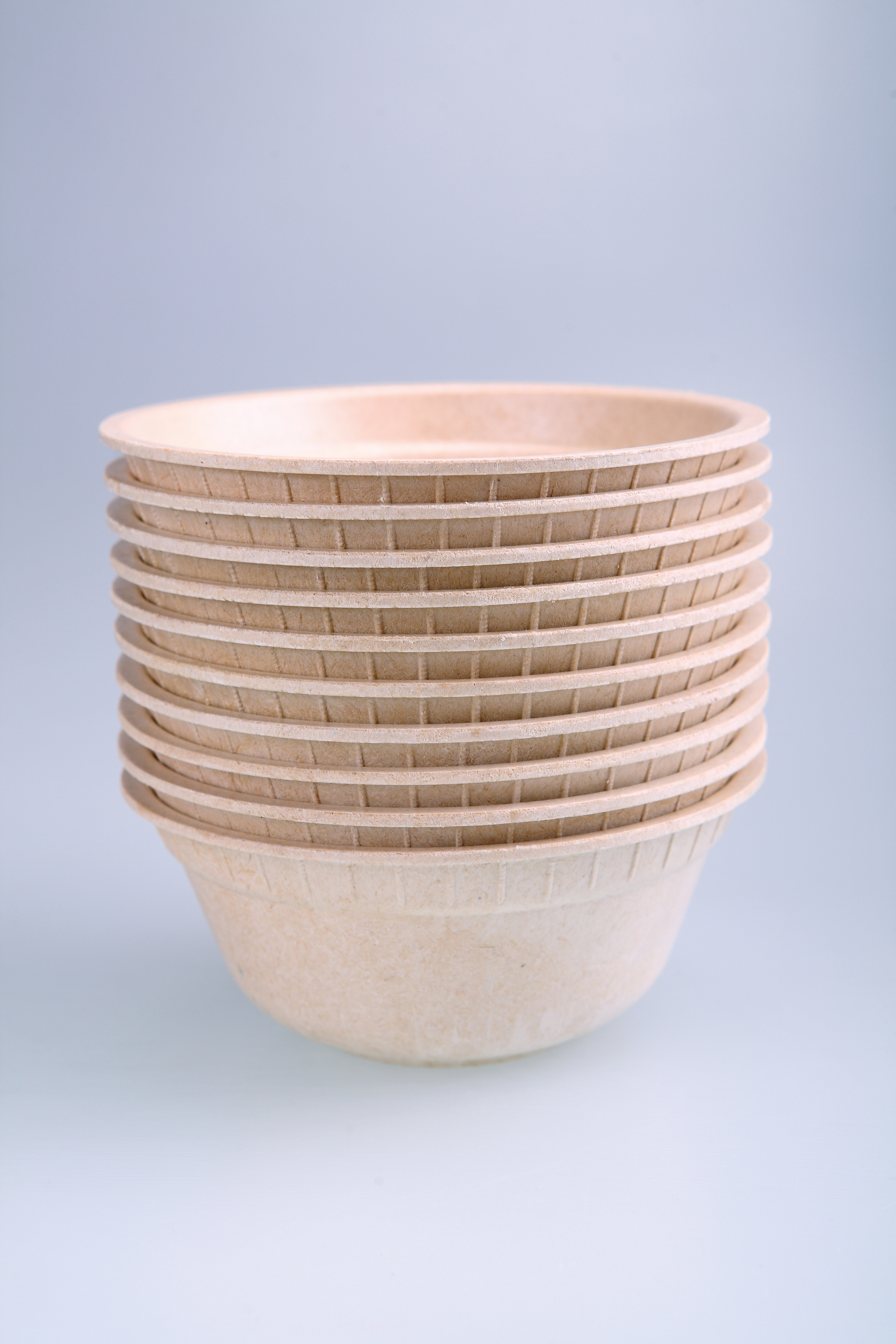UNIVERSAL BIOPACK HAS DEVELOPED HIGHLY DURABLE PACKAGING FROM BAMBOO FIBER THAT CAN NATURALLY DECOMPOSE WITHIN THE PERIOD OF ONE WEEK.
While a country such as Sweden has to import 800,0000 tons of waste per year to serve as a resource for production of its electricity, a developing nation such as ours is struggling to deal with excessive amounts of garbage let alone consider the notion of reproducing waste into something functionally productive, as managing it and keeping everything organized and clean feels like an almost impossible task to maneuver. Among the seemingly infinite amount of junk, plastic and foam are two of the most environmentally threatening types of waste with hundreds of years being needed for decomposition. We would probably be reincarnated and live through two lifetimes and plastic and foam would still be here on earth. Foreseeing such potential dilemma, Universal Biopack further developed the research done by Kasetsart University on the manufacturing of highly durable packaging that can naturally decompose within the period of one week. With bamboo fiber (industrial waste from chopstick production) and tapioca flour being the principle materials, the formula was conceived to produce a highly flexible material that could be used in the making of plates, bowls and other utensils for food and beverages, ‘Krathong’ (the adorned baskets Thais use for the celebration of the Loy Krathong Festival) and other types of packaging for furniture and telephones. Universal Biopack’s main business was primarily compact disc production, but with today’s dwindling demands for CDs, the factory has readjusted its operations to manufacture disposable packaging made of bamboo fiber. The company is currently growing and expanding its business with a plan to increase the production capacity from 300,000 to 1,000,0000 units per month. With the majority of clients being foreign companies, local restaurants and food kiosks in Thailand have not shown any interest in the product due to its higher price compared to other types of packaging available on the market.

Bamboo Packaging by Universal Biopack, Image courtesy of Universal Biopack

Bamboo Packaging by Universal Biopack, Image courtesy of Universal Biopack

Bamboo Packaging by Universal Biopack, Image courtesy of Universal Biopack
ในขณะที่ประเทศสวีเดนต้องนําเข้าขยะจากประเทศอื่นๆ ปีละ 800,000 ตัน เพื่อนํามาผลิตกระแสไฟฟ้า หันมามองประเทศกําลังพัฒนาอย่างเราๆ กลับมีขยะล้นหลามเกินจัดการ อย่าว่าแต่เอาไปใช้ให้เกิดประโยชน์เลย แค่จัดการเก็บให้สะอาดเรียบร้อยก็เหนื่อยกันจะแย่แล้ว ในจํานวนขยะที่ล้นหลามเหล่านี้ แน่นอนว่า พลาสติกและโฟมเป็นขยะท่ีส่งผลเสียต่อสภาพแวดล้อมมากที่สุดอันหนึ่งเนื่องจากใช้เวลาย่อยสลายหลายร้อยปี เรียกว่าเกิดใหม่อีกหลายชาติ พลาสติกก็ยังคงอยู่ ซึ่งเพราะเล็งเห็นปัญหานี้ ทางบริษัท Universal Biopack จึงได้พัฒนาต่อยอดงานวิจัยของมหาวิทยาลัยเกษตรศาสตร์ ผลิต packaging ท่ีมีความแข็งแรงและสามารถย่อยสลายได้ภายใน 1 อาทิตย์ โดยมีส่วนผสมสําคัญคือ เยื่อไผ่ (ท่ีได้จากเศษเหลือของอุตสาหกรรมการทําตะเกียบ) และแป้งมันสําปะหลัง สูตรของส่วนผสมที่คิดค้นข้ึนมามีความยืดหยุ่นเป็นอย่างมาก สามารถนำไปออกแบบเป็นจาน ชาม และภาชนะใส่เครื่องดื่มและอาหาร รวมไปถึงกระทง และ packaging สําหรับเฟอร์นิเจอร์และโทรศัพท์ได้หลากหลาย เดิมทีเจ้าของบริษัททํางานอยู่ในธุรกิจการผลิตแผ่นซีดี แต่หลังจากที่ความต้องการแผ่นซีดีเริ่มลดน้อยลงเรื่อยๆ เขาก็ได้ปรับเปลี่ยนโรงงานของตนมาเป็นที่ผลิต packaging เยื่อไผ่ที่ย่อยสลายได้แทน ปัจจุบันบริษัทอยู่ในช่วงเติบโตและขยายกิจการ โดยมีแผนจะเพิ่มการผลิต จาก 300,000 ชิ้นต่อเดือนเป็น 1,000,000 ชิ้น ลูกค้าส่วนใหญ่ของบริษัทมาจากต่างประเทศ ส่วนร้านอาหารตามสั่งและร้านข้าวแกงถุงในประเทศไทยยังไม่มีความสนใจในผลิตภัณฑ์นี้มากนักเพราะจะทําให้ต้นทุนสูงขึ้น
TEXT: SUPITCHA TOVIVICH
www.ubpack.com

 Bamboo Packaging by Universal Biopack, Image courtesy of Universal Biopack
Bamboo Packaging by Universal Biopack, Image courtesy of Universal Biopack